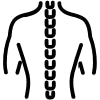Back conditions are extremely common, with up to 80% of adults suffering from lower back pain at some point in their lives. Just because they’re common, however, doesn’t mean they should be ignored. An aching back can sometimes be a sign of much more serious underlying problems.
How do you know, then, if your back pain is potentially something more dangerous?
Read on to learn the symptoms of serious back conditions and what precautions you can take to protect yourself.

Symptoms to Look Out For
Paying attention to your symptoms is the first and most important step of caring for your back. By learning which symptoms might point to more serious issues, you can better determine when it makes sense to get a healthcare professional’s opinion.
Pain in the Lower Neck
Pain in the lower part of the neck and the upper part of the back can stem from muscular issues or joint problems. However, it can also be a symptom of a more serious issue, like a discal hernia, irritation of the cervical nerves, or spinal stenosis.
If you have pain in the upper back, trouble turning your head, and/or pain or weakness in the arms and shoulders, you should consult a specialist.
According to Johns Hopkins Medicine, patients suffering from neck pain that comes with neurological symptoms, like tingling or weakness in the arms, may have conditions like cervical myelopathy. It’s thus important to consult a specialist as quickly as possible.
Tingling or Numb Limbs
If you have numb or tingling arms or legs along with your back pain, it’s possible that you’re dealing with a pinched nerve.
If you have trouble getting up or drag your feet when you walk, and if you have a feeling of heaviness or a lack of control over your legs in addition to your back ache, you may have an bone spur (bony growth around a joint) or a stenosis (gradual narrowing of the spinal canal).
Mayo Clinic explains that a pinched nerve happens when ”too much pressure is applied to a nerve by surrounding tissues, such as bones, cartilage, muscles or tendons.” This pressure can cause muscle weakness, pain, and tingling in the affected area. A pinched nerve can be a sign of a discal hernia, a vertebral fracture, a tumor, an infection, or spinal stenosis.
Bladder Problems
If your back pain comes with urinary incontinence, difficulty urinating, a feeling that your bladder doesn’t empty completely, or other bladder problems, this can point to issues in the spinal canal. Essentially, a compressed nerve is impacting your brain’s ability to communicate with organs controlled by your nerves—which then causes issues in functions like bladder control.
This problem requires immediate medical intervention, since it can lead to very serious complications—including permanent nerve damage or paralysis.
Fever
A fever can have many possible causes. However, a fever accompanied by back pain can mean something more serious, like an infection of the vertebral column or kidneys or even an epidural abcess.
An epidural abcess means that there is pus in the spinal cord and the nerve roots. Back pain, fever, chills, and stiffness in the neck are common symptoms of this condition.
Possible Causes of Serious Back Pain
Discal Hernia
A discal hernia happens when one of the discs between your vertebrae moves out of its usual position. In doing so, it puts pressure on surrounding nerves. Depending on where the hernia is located, that pressure can lead to numbness, pain, or tingling in your limbs. Discal hernias can be caused by injuries or by sudden or repetitive movements.
Vertebral Fracture
A vertebral fracture happens when you break or crack one of the bones of your spinal column. A vertebral fracture can result from a fall or an accident, such as from playing contact sports like football. Common symptoms include a loss of sensation in the limbs, persistent back pain, and in some cases, even a deformation of the spinal column that’s visible to the naked eye.
Infection in the Spinal Column
A “spondylodiscite’’ is an infection of the discs, bones, or tissues in your spinal column. The infection is generally caused by bacteria, viruses, or even fungi. Common symptoms include fever, chills, and pain in the neck. These infections require treatment to prevent serious complications, like permanent damage to the spinal column and nervous system.
Spinal Tumor
A spinal tumor is an abnormal growth of cells within or near the spine. That tumor can lead to neurological problems, weakness in the limbs, and numbness. This type of tumor comes from the bones or the tissues around the spine or nerves.
What To Do for Serious Back Pain
Several studies have shown that strengthening the back muscles helps relieve and prevent back pain.
To learn more about easy, effective back pain solutions, check out our articles:
When it comes to serious back pain, it’s important to react as quickly as possible so that the condition doesn’t get worse. Above all, we recommend that you consult a specialist to get a precise diagnosis.
Since getting an appointment with a specialist like a doctor, physical therapist, or chiropractor can take time, we recommend that you rest and avoid any potentially dangerous activities as you wait to be seen. You can take nonsteroidal anti-inflammatory drugs (NSAIDs) like ibuprofen to help manage your pain, and you can reduce any inflammation by applying ice. Certain exercises recommended by healthcare professionals can also help minimize your pain.
If you’re worried that your back pain may be serious, the most important thing is to listen to your body. Symptoms like a fever, pain in your neck, bladder problems, tingling, or numbness often point to bigger problems. If you’re experiencing these symptoms, see a healthcare professional as quickly as possible to find out what you may be suffering from and make sure that your condition doesn’t worsen.

FAQ: How to Tell If Your Back Pain is Serious
How will I know if my back pain is something more serious?
To figure out if your back pain is serious, you should first consider the intensity of your pain and what other symptoms you’re having, like trouble moving, fever, bladder problems, numbness, or tingling. Paying attention to your symptoms can often point you in the right direction.
What does it mean if my neck is hurting?
Pain in the neck can be due to muscle tension, poor posture, or conditions like discal hernias. If it lasts a long time or worsens, speak to your doctor.
If I’m feeling tingling or numbness in my limbs alongside my back pain, should I be worried?
If these symptoms persist or if you have trouble moving your limbs, it could indicate a problem with your nerves. We recommend consulting a doctor.
I’m having bladder or intestinal problems with my back pain. What could it mean?
If you’re experiencing bladder or intestinal issues with your back pain, it’s possible that you may have a serious condition like:
- a discal hernia,
- a serious spinal injury,
- or a tumor.
These conditions can be caused by compression in the nerves or spinal cord, and they can lead to paralysis.
How can I distinguish regular back pain from back pain with a fever?
If, for several days in a row, you have a fever in addition to your back pain, it could indicate a more serious back problem, like an infection.











